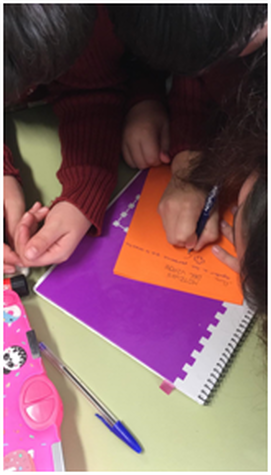© Global Education Derby 2020. All rights reserved. The In Others' Shoes resources are copyright but may be reproduced by any method without fee for teaching purposes.
For copyright in any other circumstances, for re-use in other publications or for translation or adaptation, written permission must be obtained from Global Education Derby: http://www.globaleducationderby.org.uk/contact.html
Global Education Derby is a Registered Charity No. 1049591 and a Company Limited by Guarantee registered in England & Wales No. 2642026.
For copyright in any other circumstances, for re-use in other publications or for translation or adaptation, written permission must be obtained from Global Education Derby: http://www.globaleducationderby.org.uk/contact.html
Global Education Derby is a Registered Charity No. 1049591 and a Company Limited by Guarantee registered in England & Wales No. 2642026.
|
Migration Journeys -
How was the journey? |
| ||||||
Title of Lesson |
Time Required |
Age Range |
Resources required |
Migratory Journeys - How was the journey? |
2 hours |
10 - 13 |
Creative materials - journal/notebook, pens, etc. |
Lesson Objective |
Knowledge and Understanding (Global Theme covered) |
Global Skills covered |
Global Values and Attitudes covered |
Become aware of inequalities between countries and relate them to migratory flows |
Social justice and equity Globalisation and interdependence |
Empathy Communication |
Commitment to social justice and equity |
-
Introduction
-
Main Activity
-
Plenary
-
What were the Outcomes?
<
>
This is a follow up activity after playing the two simulation games exploring inequality and prejudice in previous sessions. Support the pupils to recall the reasons why people may need to leave their home and make a new home in another country. What problems may they encounter before and after arrival?
This process could be supported through the use of carefully selected short stories or animations, for example Ali's Journey from Afghanistan https://www.bbc.co.uk/programmes/b01k7c4q/clips
Children can write the reasons for migration or feelings related to inequality or discrimination on the boats made during session 1.
This process could be supported through the use of carefully selected short stories or animations, for example Ali's Journey from Afghanistan https://www.bbc.co.uk/programmes/b01k7c4q/clips
Children can write the reasons for migration or feelings related to inequality or discrimination on the boats made during session 1.
Methodology:
The children are challenged to create a travel journal documenting the migratory journey. This journal is to be shared with a real audience of the teachers' choice to provide context and purpose - this could be another class, a community group, a travel journalist or work could be displayed in a library or a museum.
Activity: Preparation of a "travel notebook"
Children can present their ideas and research in any form but the emphasis is on whole class cooperation, rather than competition between groups.
• Group 1: Reasons for the trip.
• Group 2: Travel obstacles.
• Group 3: Arrival in Spain (welcomed by society, work, language, differences cultural ...)
• Group 4: Positive things to learn from Spain.
• Group 5: Positive things to contribute to Spain.
Groups can be asked to provide progress reports and also give/accept suggestions for how their part of the journal can be improved or extended. An editorial deadline can be set when all content must be submitted for approval.
The children are challenged to create a travel journal documenting the migratory journey. This journal is to be shared with a real audience of the teachers' choice to provide context and purpose - this could be another class, a community group, a travel journalist or work could be displayed in a library or a museum.
Activity: Preparation of a "travel notebook"
Children can present their ideas and research in any form but the emphasis is on whole class cooperation, rather than competition between groups.
• Group 1: Reasons for the trip.
• Group 2: Travel obstacles.
• Group 3: Arrival in Spain (welcomed by society, work, language, differences cultural ...)
• Group 4: Positive things to learn from Spain.
• Group 5: Positive things to contribute to Spain.
Groups can be asked to provide progress reports and also give/accept suggestions for how their part of the journal can be improved or extended. An editorial deadline can be set when all content must be submitted for approval.
Evaluation (Reflection on the dynamics):
Reading of the entire notebook and subsequent sharing with the class and wider intended audience. Teacher takes the role of facilitator and guide, mediating between the pupils and intended audience to ensure a collaborative approach and shared understanding is developed.
It is important that the children have a sense that the notebook has a real purpose and audience.
For example, the teacher may ask "Send me the travel notebook to take to the meeting that I have next. After the meeting I will give your notebook back and you can show it in the classroom"
Reading of the entire notebook and subsequent sharing with the class and wider intended audience. Teacher takes the role of facilitator and guide, mediating between the pupils and intended audience to ensure a collaborative approach and shared understanding is developed.
It is important that the children have a sense that the notebook has a real purpose and audience.
For example, the teacher may ask "Send me the travel notebook to take to the meeting that I have next. After the meeting I will give your notebook back and you can show it in the classroom"
The children developed a greater understanding of the complex issues behind migration and the challenges faced.
They were supported to develop empathy and an awareness of the needs and contributions of others to society.
They developed skills of selecting appropriate material, presenting information and ideas clearly, and cooperating to work towards a final product.
They were supported to develop empathy and an awareness of the needs and contributions of others to society.
They developed skills of selecting appropriate material, presenting information and ideas clearly, and cooperating to work towards a final product.
Lesson submitted by Aida Lorenzo Perez, Spain





